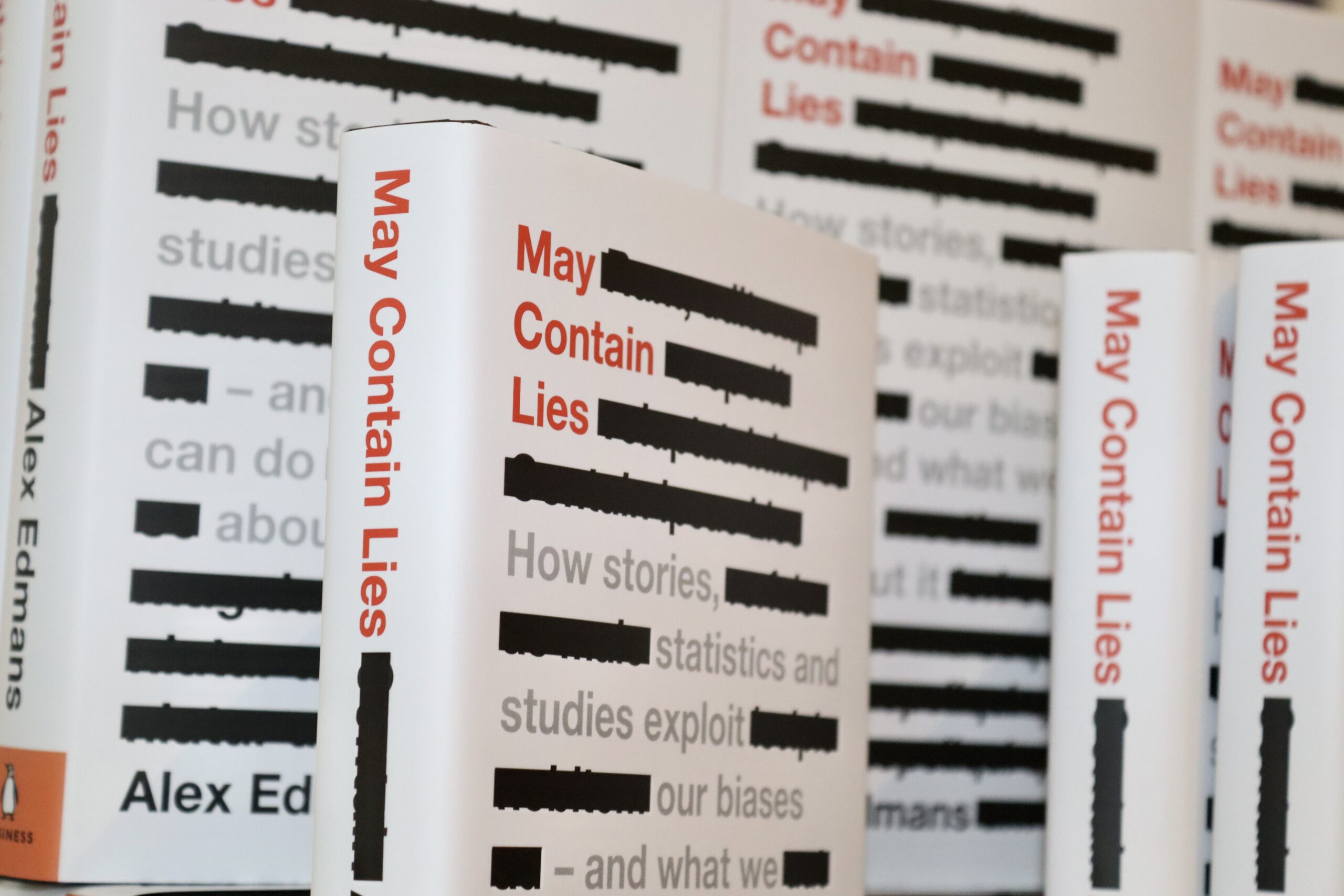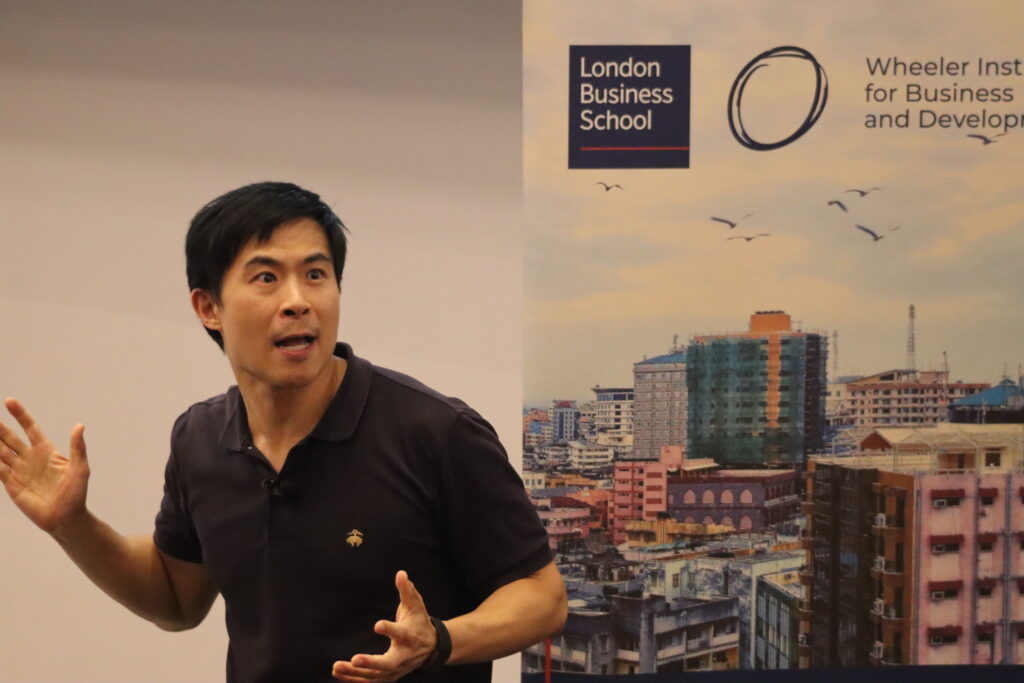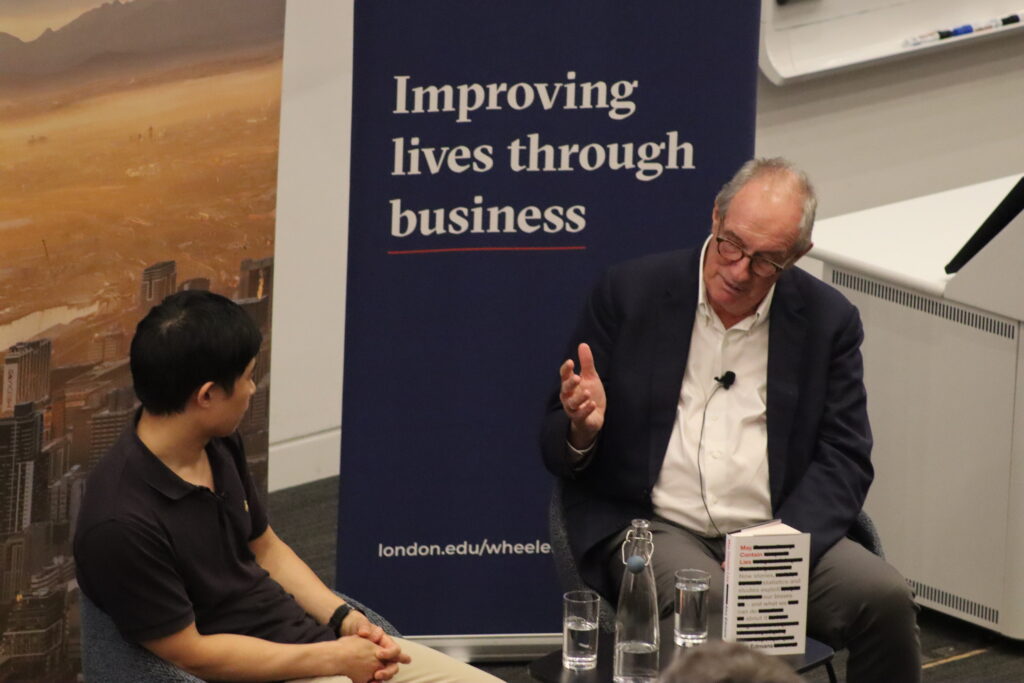
How do you separate fact from fiction? Can we spot a lie in a sea of information? The Wheeler Institute recently welcomed Alex Edmans (Professor of Finance at London Business School, renowned TED talk speaker and author of Grow the Pie: How Great Companies Deliver Both Purpose and Profit) to discuss his latest title, May Contain Lies: How Stories, Statistics, and Studies Exploit Our Biases—And What We Can Do about It.
Based on the book, the event confronted the biases we encounter and how to distinguish and achieve verifiable truths amidst misinformation. Professor Edmans highlighted how we often conflate different levels of certainty, mistakenly treating opinions as facts, isolated facts as comprehensive data, raw data as conclusive evidence, and suggestive evidence as definitive proof. The event also included a conversation between Professor Edmans and Will Hutton (Political commentator and author of This Time No Mistakes: How to Remake Britain).
What do we mean by ‘Misinformation and Bias’?
Professor Edmans started by showing how our lives are filled with misinformation through our day-to-day interactions with the world: social media, TV, newspapers, books, etc. The book offers a compelling examination of how we interact with data and the biases that shape our interpretations. Edmans evidenced the challenge of making informed decisions amid an immense number of studies, statistics, and opinions, which not only inundate everyone but also allow people to use evidence to support the position they are looking for.
He opened the discussion with an example – the ostensible link between breastfeeding and the intelligence of newborn babies. He brought up a set of articles and studies that corroborated the link, and expanded on his own experience of becoming a father for the first time, and how such sources had influenced his and his wife’s attitudes towards breastfeeding. Yet, deeper scrutiny of the initial study found that any difference in IQ between breastfed and bottle-fed kids stemmed not from the feeding method but family background. Mothers who were more affluent, educated, and had more supportive home environments were more likely to breastfeed. These factors heavily influenced differences in IQ, so it is impossible to establish a causal link between breastfeeding and intelligence based on these results, despite the ways in which the media – and popular culture – may have traditionally interpreted them. Thus, the study contains misinformation.
Professor Edmans went on to discuss the biases inherent in this example. One is ‘confirmation bias’: culturally, we expect ‘natural’ to be superior to ‘unnatural’ things because we have been conditioned to think that they are healthier. Then, when we hear that breastmilk is better than synthetic milk it consolidates what we already believe, and so we accept it as fact. This is known as ‘confirmation bias’. This is exacerbated by a second bias, ‘black-and-white thinking’, which means that we divide the world into binary categories. Then, we think that synthetic milk is always worse than breastmilk, and so mothers should exclusively breastfeed their babies rather than using a combination. We reject complexities in our perception of the world and thus act based on a simplified understanding of it.

The Ladder of Misinference: a scientific approach to avoid misinformation
The book analyses the consequences of bias by assessing five key categories of information: statement, fact, data, evidence and proof. This model is what Edmans terms ‘The Ladder of Misinference’, and relates to the ‘steps and missteps’ people commonly take when they approach different forms of information. He therefore builds ‘problems’ of misinformation into four key chapters in the book: ‘A Statement is Not Data’; ‘A Fact is Not Data’; ‘Data is Not Evidence’; and ‘Evidence is Not Proof’. In this way, May Contain Lies begins to chart a course for each of us to follow when attempting to challenge the sources we are exposed to and the beliefs that we hold.
Conversation with Will Hutton
During their discussion, Edmans and Hutton explored the role of the scientific method in decision-making, emphasising the need to start with a falsifiable hypothesis to pursue truth. They contrasted this with advocacy, where predetermined viewpoints seek supportive studies, leading to misleading conclusions. Edmans cautioned against the pitfalls of being overly critical and perfectionist in academia, noting that this can impede practical progress. He pointed out that practitioners often need to make decisions with 90% certainty within a few months, whereas academics might strive for near-absolute certainty over five years. Referencing Daniel Kahneman’s work on ‘Thinking, Fast and Slow,’ Edmans explained the necessity of balancing quick, intuitive responses with deliberate, analytical thinking for effective decision-making.
Hutton praised Edmans’ advocacy for cognitive diversity, emphasizing how it can lead to better decision-making in corporate and societal contexts. They argued that cognitive diversity, beyond demographic factors, enriches perspectives and fosters innovation. They discussed the importance of integrating employee satisfaction into corporate performance metrics, linking this to Professor Edmans’ research on job satisfaction and firm value, noting that contributions outside traditional financial metrics can significantly impact overall success.
Finally, during the Q&A, the speakers explored the societal impact of misinformation and the importance of critical thinking from an early age. Discussions touched on the role of education, media literacy, and the potential of AI in mitigating misinformation. The session concluded with a reflection on the political implications of misinformation and the need for better platforms for public discourse.
These and other concepts and examples are elaborated in May Contain Lies: How stories, statistics and studies exploit our biases – and what we can do about it by Alex Edmans, which you can find here.

About the Speakers

Alex Edmans is Professor of Finance at London Business School. In 2013, he was awarded tenure at The Wharton School and in 2021, was named MBA Professor of the Year by Poets and Quants. Edmans writes regularly for the Wall Street Journal, Financial Times and Harvard Business Review. His first book Grow the Pie (Cambridge University Press) was a Financial Times Book of the Year. His TED talk ‘What to Trust in a Post-Truth World‘ has been viewed 2 million times. He has also spoken at Davos and Google.

Will Hutton is a British journalist and author. He currently writes a regular column for the Observer, is the president of the Academy of Social Sciences, hosts its We Society podcast and is co-chair of the Purposeful Company. He was formerly economics editor of the Guardian, editor-in-chief of the Observer and Principal of Hertford College Oxford. Hutton’s books include the bestselling The State We’re In, How Good We Can Be, The World We’re In and The Writing on the Wall. His most recent publication, ‘This Time No Mistakes: How to Remake Britain‘ has been heralded by the likes of Sir Keir Starmer as ‘an intellectual, historical, political read with some strong themes’, and is available to purchase now.
